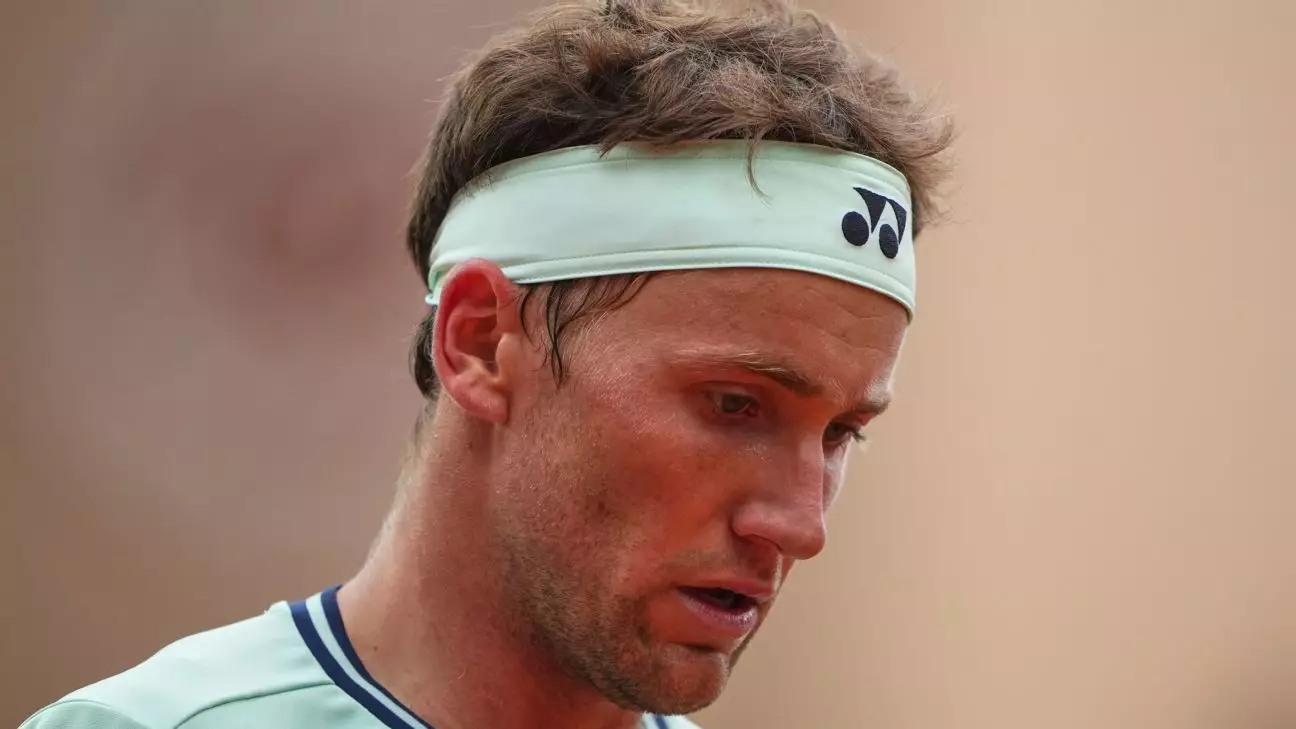In a surprising turn of events at the French Open, two-time finalist Casper Ruud showcased both the fragility and determination that accompany elite athletes. Competing against Nuno Borges in the second round, Ruud’s performance was marred by a significant physical ailment—persistent pain in his left knee. Despite being a clear crowd favorite and the seventh seed, Ruud faced a disheartening defeat, succumbing to Borges with a scoreline of 2-6, 6-4, 6-1, 6-0. This loss not only marks Ruud’s earliest exit from the tournament since his 2018 debut but also raises questions regarding the impact injuries can have on an athlete’s mental stamina and physical performance.
Ruud’s knee issue is not a new adversary; in fact, it has plagued him throughout the clay-court season. Just weeks before this monumental clash, he had been resorting to pain-killers and anti-inflammatory medication, a telltale sign of an athlete grappling with the duality of ambition and physical limitations. His candid admission of deteriorating performance due to pain during critical shots reveals the vulnerabilities that even the best players experience. The demands of professional tennis require not just skill but also an imperative level of physical health, and when that health is compromised, the ensuing challenges can be overwhelming.
The Rise of Nuno Borges
Nuno Borges, whose remarkable journey has led him to be the first Portuguese man to reach the French Open’s third round, expertly capitalized on Ruud’s misfortunes. Winning 13 of the last 14 games against a continents-colliding rival is no small feat, especially in a Grand Slam setting. Borges’s victory represents a pivotal moment not just in his career, but also for Portuguese tennis as a whole. Tracing back to his victory, we witness a player who embodies resilience and seizes opportunity amidst uncertainty—an ethos that is much celebrated in competitive sports.
Having faced Ruud, a player who has consistently reached at least the semifinals in previous years, Borges entered the match as an underdog but displayed remarkable tenacity. His ability to adapt and counteract the heightened stakes of a prestigious tournament like Roland Garros speaks volumes about his character and potential for the future. The psychological triumph of overcoming a higher-ranked opponent is a worthy milestone, and Borges has set the stage for future challenges against players like Alexei Popyrin, who awaits him next.
Alcaraz: The Unyielding Champion
While Ruud’s knee has become a focal point of discussion, another young tennis sensation, Carlos Alcaraz, continues to solidify his position at the forefront of the sport. In his second-round match against Fabian Marozsan, Alcaraz showed glimpses of vulnerability yet successfully steered through his challenge with a scoreline of 6-1, 4-6, 6-1, 6-2. The contrast of styles and tactics in tennis is often mirrored in a player’s ability to manage not just their game, but their emotional state during unpredictable phases of a match.
What’s particularly fascinating about Alcaraz’s journey is his innate ability to remain calm and collected, even when facing game-changing moments. His composure allows him to shift momentum in his favor, a skill evident during his encounter with Marozsan. Alcaraz’s remarks following the match highlight a critical aspect of championship mentality: recognizing the fine line between confidence and complacency.
The Complex Nature of Competitive Tennis
As the tournament progresses, the interplay of physicality and mental strength will continue to shape outcomes on and off the court. The trajectory of the competition underscores a truth about elite sports—athletes must grapple not only with their competitors but also with their own subliminal fears and limitations. Injuries such as Ruud’s can foster a sense of vulnerability that demands exceptional resilience to counteract.
Throughout his journey, Ruud has exhibited a singular commitment to his craft, yet it is precisely this commitment that can lead to an overwhelming desire to push beyond physical boundaries. The burden of expectations weighs heavily on a player like Ruud, who has cultivated a reputation over years of hard work and determination. In the fickle world of sports, a single injury can significantly alter an athlete’s career trajectory, making it crucial for players to navigate both their physical challenges and their emotional well-being with acute awareness.
The unfolding stories at Roland Garros continuously remind us that the path to greatness is rarely linear. Competitive sports are laden with heartbreak, resilience, and unyielding spirit, as showcased brilliantly by athletes who battle both pain and pride under the high-pressure spotlight of the Grand Slam stage.

